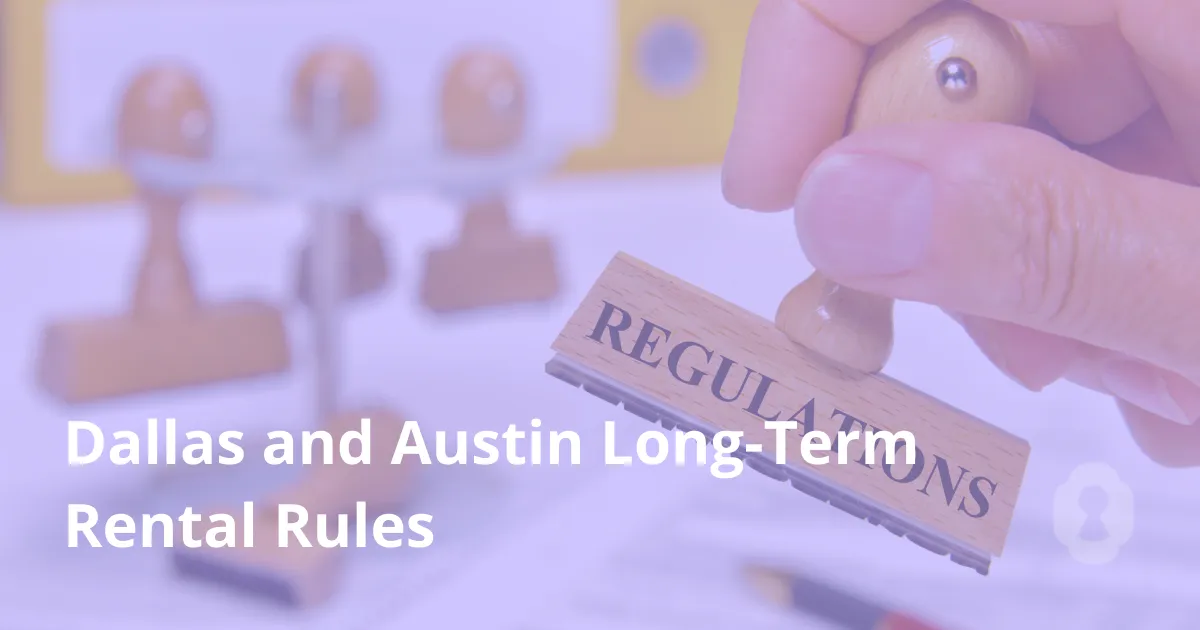
When you're looking to rent in Texas, knowing the rules is key. The Texas Department of Licensing and Regulation (TDLR) is in charge of many things, though it has no direct authority over long-term rental properties.

"What we're seeing across Texas isn't just regulatory fragmentation—it's a fundamental tension between housing as community infrastructure and housing as economic opportunity. The patchwork of long-term rental regulations between Dallas and Austin represents different visions of what neighborhoods should be. Forward-thinking property managers must now serve as regulatory translators, helping owners navigate compliance while preserving sustainable community integration. The most successful operators will be those who view city regulations not as obstacles but as frameworks for sustainable community development."
Taylor Wilson, CEO of Rent with Clara
The rental market in Texas is changing fast. This is because of evolving city regulations and state preemption laws. Cities like Dallas and Austin are taking different approaches to long-term rental oversight.
Long-term rentals continue to grow in popularity. This is thanks to economic factors and changing housing preferences.
The rise in long-term rental properties is helping local economies. It's adding to property tax revenues and supporting local businesses.
Texas state legislation provides the foundational framework for long-term rental operations, with significant variation as each municipality develops its own system of long-term rental regulation. The state has been working toward establishing a better system of long-term rental oversight that balances property rights with local government authority.
Recent legal challenges have emerged when local governments have attempted to implement regulations, leading to court decisions that clarify the boundaries between state and local authority. Dallas county judge rulings and similar judicial decisions across Texas have established precedents for how far local governments can go in regulating long-term rentals.
The evolving legal framework continues to influence how cities structure their system of long-term rental regulation, creating a complex environment where property owners must navigate both state statutes and local ordinances.
Before you start a long-term rental operation, conducting thorough market research is essential to understand the demand for long-term rentals in your target area. The market for long-term rentals varies significantly between different Texas cities, with factors like job growth, population trends, and housing supply influencing profitability.
Investors in Dallas should analyze occupancy rates, average rental rates, and market stability to determine the viability of their rental business. Property selection is crucial for a successful long-term rental business, as location directly impacts tenant retention and rental rates.
Rental operators should also factor in startup costs including property improvements, insurance, and legal compliance expenses, as these can significantly impact initial profitability and cash flow for the first year of operations.
To follow rental rules, it's key to know how state law and city regulations in Dallas and Austin work together. These cities have rules that mix state laws and city regulations. This mix affects how rentals are managed.
State law gives the basic rules for rentals in Texas, including Dallas and Austin. But, city regulations can change how these rules are applied. They also set specific needs for property owners.
Key differences between state law and local ordinances include:
For example, state law provides basic landlord-tenant frameworks. But, Dallas and Austin might have extra rules. These could include needing special permits or registration requirements.
Recent laws have changed how long-term rentals are handled in Dallas and Austin. The Texas Department of Licensing and Regulation (TDLR) keeps an eye on new laws, though TDLR has no direct authority over rental properties.
Some key legislative changes include:
It's important for property owners and renters to keep up with these changes. This helps them stay in line and avoid fines.
The regulatory approach to long-term rentals varies dramatically across Texas metropolitan areas, with each city developing unique frameworks based on local priorities and community needs. While Austin relies primarily on state law for long-term rental oversight, other major Texas cities like Dallas, Houston, San Antonio, and Fort Worth have adopted different strategies for managing rental growth.
Some municipalities focus primarily on registration and basic safety requirements, while others have implemented more comprehensive licensing and operational requirements. Dallas represents the most comprehensive approach in the spectrum of Texas municipal regulation, requiring mandatory registration and extensive compliance activities for rental properties.
This patchwork of regulations demonstrates how local priorities regarding housing stability, property tax revenue, and neighborhood character influence the development of long-term rental policies, with some cities prioritizing economic benefits while others emphasize residential community protection.
It's important for property owners in Dallas to know the rental rules. The city has comprehensive rules for licensing, registration, and taxes on rental properties.
Rental properties in Dallas need mandatory registration under the Single Family Rental Registration Program. You must apply and pay the $64 annual fee. The registration requirements help ensure properties are safe and meet quality standards.
Property owners need to show they own the property or have the right to rent it. Properties might need an inspection to check if they meet city standards. Registration needs to be renewed before June 1st each year.
Dallas allows long-term rentals in most residential zones without special permits. These rules help integrate rentals into residential areas appropriately.
Property taxes are key for rental operations in Dallas. Owners must pay standard property taxes and comply with federal income tax requirements for rental income.
The steps are:
By following these rules, property owners in Dallas can operate legally and efficiently.
Dallas rental owners face comprehensive regulatory requirements as the city of Dallas maintains extensive oversight of rental properties. Unlike other Texas cities with minimal regulations, Dallas hosts must navigate detailed licensing requirements and registration processes before operating their rental unit.
The city of Dallas requires owners to register with the city and obtain proper licensing before renting their property. Dallas rental operators should stay informed about city code compliance requirements and maintain detailed records of all rental activities.
Rental owners in Dallas must understand that the city of Dallas takes a comprehensive approach to regulating rental properties compared to other Texas cities. Investors in Dallas should be aware that the city limits define specific requirements where long term rentals must be registered, and property owners must navigate existing ordinances that affect their rental operations.
The registration process requires hosts to provide detailed information about the property and ensure the property meets all safety and zoning requirements. Successful long-term rental operations in Dallas require building relationships with neighbors and understanding community concerns.
It's key for property owners to know Austin's approach to long-term rentals. Austin is lively and popular, but it has minimal city regulations for long-term rental properties compared to its comprehensive oversight of short-term rentals.
Austin does not have comprehensive city-specific regulations for long-term rentals:
Austin relies primarily on Texas state law for long-term rental oversight. Property owners follow Texas property code requirements and standard landlord-tenant laws without additional city oversight.
Austin requires licensing only for:
Austin's rules focus on basic building and safety codes rather than comprehensive rental regulations.
Beyond standard property taxes, rental owners operating a long-term rental business must understand various tax obligations at both federal and state levels. Income from long term rentals is considered business income by the IRS, requiring detailed record-keeping of rental income, operating expenses, and depreciation.
Texas state law doesn't impose a state income tax, but rental operators must still comply with federal tax regulations and may qualify for business deductions on expenses like maintenance, utilities, and property management fees.
Property taxes may also be affected when operating rental properties, as some jurisdictions assess rental properties differently. Rental business owners should consult with tax professionals to ensure compliance with all applicable tax laws and to maximize legitimate deductions while maintaining proper documentation.
Property owners in Dallas and Austin need to follow certain rules to avoid problems. It's important to make sure your rental places meet all the city regulations. This is not just a legal thing, but also good for your business.
Keeping good records is key for property owners. You should track rental deals, tenant info, and money matters related to your property.
Getting the right insurance is crucial for your rental places.
Consider these types:
Communicating with your neighbors about your rental can help avoid problems and build good relations.
Here are some tips:
By sticking to these rules, property owners in Dallas and Austin can follow city regulations and maintain a good reputation in their areas.
The long-term rental industry has grown significantly. Property management companies have established systems to follow city regulations. They use a mix of compliance procedures, registration management, and support for property owners.
Property management companies have regulations for property owners. These rules cover following city regulations. It's key for running smoothly and legally.
Companies use automated registration systems for jurisdictions like Dallas. These systems ensure proper registration and fee payment to the right places.
Companies give property owners many resources to follow city regulations. They offer guides, training, and support. These help owners understand the laws and how to follow them.
With these tools, property management companies help the long-term rental market work well. It helps everyone involved and makes the industry more professional.
City councils in Dallas and Austin work to enforce rental laws. They make sure property owners follow the rules and keep the rental market fair and safe.
Regular checks are key to enforcing rental rules. In Dallas, licensing requirements and registration compliance are closely monitored through inspections. This ensures property owners follow city laws and maintain property standards.
Austin focuses on basic building code compliance for rental properties. They check if these properties follow standard safety requirements without specialized rental regulations.
If a property doesn't follow the rules, owners face penalties. The fines in both cities aim to keep everyone in compliance with state law and city regulations.
Neighbor complaints often lead to enforcement actions. Both cities have systems for people to report problems with rental properties.
Property owners should respond promptly to complaints and maintain good neighbor relationships to avoid enforcement actions.
Knowing the rental rules in Dallas and Austin is key for both property owners and renters. These cities have very different approaches to long-term rental oversight. Dallas has comprehensive city regulations while Austin relies primarily on state law.
In Dallas, there are extensive licensing requirements and registration mandates. But Austin has minimal city regulations for long-term rentals. Property owners must follow Texas property code and understand how city rules apply to their rental activities.
Property owners should keep up with the latest regulations. This helps them deal with the different regulatory approaches in Dallas and Austin. By staying informed about existing ordinances and city code requirements, they can manage their rental properties successfully while maintaining compliance with both state law and city regulations.